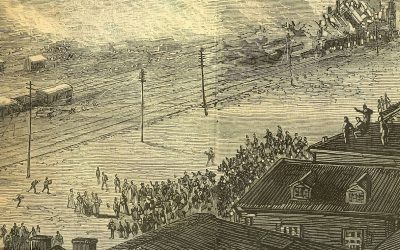The principle that in a free market there tends to be a uniform price for the same good throughout the world has major application to the Arab oil embargo of 1973–74. The principle shows that if the United States had had a free market in oil when the Arabs imposed their embargo, our oil supplies could not have been seriously jeopardized.
What if the U.S. had a free market in oil in 1973-74?
Let us think back to the time of the embargo, and imagine that everything else is the same except that the United States has a free market in oil.
The Arabs now launch their embargo. The immediate effect is that a large part of the oil supplies of the northeastern United States—the major importing region and the one dependent on the Arabs—is cut off. In a free market, no sooner would this have happened, than the price of oil and oil products in the Northeast would have begun to rise. Once prices in the Northeast came to exceed those in the rest of the country by more than the costs of transportation, supplies would have moved from the rest of the country to the Northeast. The effect would have been largely to replenish supplies in the Northeast and to reduce supplies somewhat in the rest of the country. The reduction in imports from the Arabs, in other words, would have been spread over the whole country instead of being concentrated in the Northeast, where it threatened to cripple the economy of the region. In this way, its impact would have been minimized. Prices in the Northeast would have been held down by the inflow of the new supplies, and those in the rest of the country raised up by the shipments to the Northeast. In fact, the higher level of oil prices in the Northeast and in the country as a whole would have acted as a magnet to supplies of oil from outside the country. The same motives that would have impelled a Southern or Midwestern oil producer to send additional supplies to New York or Boston would also have impelled a Venezuelan or Nigerian producer to do so. In fact, additional imports could have come from the most remote places. As the rise in prices in the Northeast pulled up prices in the rest of the country, it could very well have become profitable to start shipping additional supplies to the West Coast from oil-producing areas like Indonesia, thereby freeing more domestic production for supplying the Northeast.
Indeed, the United States could have gone on benefitting from Arab oil! This would have occurred simply as a result of expanding the import of refined petroleum products made from Arab oil in places not subject to the Arab embargo. For example, if the Arabs continued to supply Spanish refineries, say, and the price of refined products had risen in the United States, those refineries would have diverted more of their output to the United States.
Oil price controls made the Arab embargo a threat
It thus becomes apparent that within a fairly short time 17 This has already been indicated in connection with the uniformity-of-profit principle. See above, sec. 1, the last part of the subsection “Additional Bases for the Uniformity-of-Profit Principle.” an embargo by the Arabs against oil shipments to the United States would have had very little effect on the supply of oil in the United States. To the extent that the United States had been importing Arab oil, it would, for the most part, merely have changed importers, and, for much of the rest, it would even have continued to benefit indirectly from Arab oil, in the form of importing refined products made from Arab oil in non-Arab countries. The reason the Arab embargo did threaten us was the existence of our price controls on oil and oil products. These price controls had been imposed by President Nixon in August of 1971, as part of a temporary general price freeze, and then remained in force after almost all of the other price controls were removed. Thus, when oil supplies to the Northeast were cut off by the embargo, price controls prohibited the people in the Northeast from bidding up oil prices. The people in the Northeast were therefore made powerless to bring about the shipment of additional supplies from the rest of the country. In the same way, price controls prohibited the people of the United States as a whole from biding up prices, with the result that it was not possible to bring about stepped-up imports from non-Arab sources. The effect of our controls was to cause the reduction in imports from the Arabs to be experienced with full force at its initial point of impact and to make it impossible to obtain replacement imports. Our price controls paralyzed us—they made it impossible for us to take the actions needed to deal with the situation.
Indeed, because of our price controls, we were not only prevented from finding replacement imports for the loss of Arab imports but were forced to lose imports from non-Arab sources as well! This happened because other countries in the world, such as West Germany, became better markets in which to sell oil than the United States. As a result, our non-Arab foreign suppliers were led to selling more of their oil to those countries and less to us. Because of our price controls, we tied our hands in the international competition for oil and made it possible for countries far poorer than ourselves to outbid us for oil we had normally consumed.
* * *
There is more to say about why a free American economy would have had nothing to fear from an Arab embargo.
In late 1973 and early 1974, the Arabs were apparently threatening to cut off oil supplies to the world. There was near panic over whether they would do so. There seemed to be no solution except either to give in to their demands, whatever they might be, or go to war with them.
If we had had a free economy, the only lasting effect of any embargo the Arabs might have launched against the rest of the world would have been to strengthen our oil industry at the expense of their oil industry. To understand this point, let us assume that the American economy had been free of all price controls in 1973 and that the Arabs had launched their embargo with the serious intention of cutting off their supply of oil to the world. Let us assume that the worst fears people had at the time came true and that the Arabs simply stopped selling oil to anyone, in an effort to blackmail the world into doing their bidding.
The effect, of course, would have been a skyrocketing in the price of oil.
But observe. The Arabs wouldn’t have gotten the benefit of the higher price, because they wouldn’t have been selling any oil.
The benefit of the higher price of oil would have gone to the non-Arab producers, mainly to the producers in the United States.
The American oil companies in that case really would have made fabulous profits. They might have made profits at a rate fast enough to double their capital in a single year or less. They would have made the kind of money the Arabs made.
In the face of the Arabs’ withdrawal from the market, a tendency would have set in to reestablish the United States as an oil exporter, because Western Europe and Japan would have had to turn to us. However much prices skyrocketed here, they would have skyrocketed still more there. Instead of our high prices pulling oil in, we would have begun to ship oil out, in response to their still higher prices. Billions of dollars would have begun to flow from Western Europe and Japan to the United States, not to Iran or Saudi Arabia.
With vast profits starting to pour in from the rest of the world and, of course, from American buyers too, huge sums would have become available for every kind of oil and energy project in the United States. It would not have taken long, with such profits, for the domestic oil industry to have been entirely rejuvenated and established on an enormously larger scale than ever before, and who knows what other new sources of energy along with it.
Now consider the Arabs. While the American oil producers would have been making money hand over fist, the Arabs would have been starving for lack of income. In this context, it would have been virtually certain that the Arab alliance would soon have broken up. The less fanatical Arab countries would soon have resumed the sale of oil in order to cash in on the profits. Probably, in very short order, all of them would have begun selling again. So, in fact, the supply of oil in the world would almost certainly not have been drastically reduced for very long, despite whatever intentions the Arabs may originally have had. And, therefore, the United States would not, in fact, have had to switch for very long, if at all, from the role of an oil importer to the sudden role of an oil exporter. But to whatever extent the Arabs had delayed in resuming the sale of oil, the effect of their action would have been to impoverish themselves while enormously enriching the oil industry in every other country, especially the United States.
In the years that followed, the American oil industry would have been bigger and richer. American oil production and the production of other forms of energy in the United States would have been expanded because of the additional profits that American firms had earned. Very possibly, a year or two after the embargo, the price of oil would have fallen below its level in the period before the embargo, because of expanded American production. The oil industry at that point might have run at losses for a while. The American firms would have been able to cover their losses out of the profits the Arabs had handed them. The Arabs would not have been able to cover their losses as easily. Consequently, the effect of the whole process would have been a larger American oil industry and, quite possibly, a smaller Arab oil industry.
This is what economic freedom would have accomplished.
* * *
The question might be raised of just how high oil prices could have gone during the Arab embargo if we had not had price controls. It is impossible to answer such a question with any accuracy. Perhaps for a brief period, we might have had very high prices for oil and oil products. While they lasted, such prices would certainly have represented a hardship for many people, the author of this book included. But later we would have had lower prices than we had, thanks to the larger domestic oil industry and energy industry in general. Indeed, the preceding discussions make clear that the rise could not have been very great for very long, and that in a short time, oil prices would have begun to fall, just as has turned out to be the case since the repeal of the price controls. Furthermore, as we will see, even while a high price lasts, the real problem is not the high price, but the scarce supply. No one’s hardship is alleviated by a low price for goods he cannot buy, which is always the effect of price controls. If we in fact have scarcity, and consumption must be restricted, then, as will be shown, the high price is necessary and positively beneficial, because it leads people to restrict their consumption in the ways that are least damaging to themselves.
The policy of price controls on oil during the embargo, therefore, cannot even be said to have sacrificed our long-run economic well-being to our short-run economic well-being. It sacrificed both our long-run and our short-run economic well-being.
Adapted from Reisman’s Capitalism: A Treatise on Economics, Chapter 6, The Dependence of the Division of Labor on Capitalism, Why the Arab Oil Embargo Would Not Have Been a Threat to a Free Economy.”




